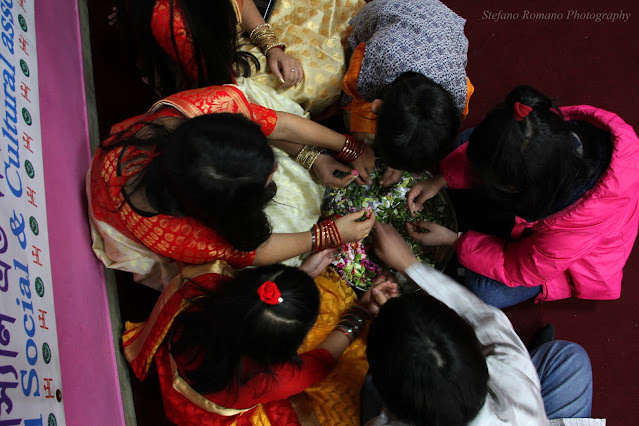 |
| Sarbojonin Hindu Puja. Roma, 5 February 2021 |
On Saturday 5th February, the prayer – puja – for Saraswati was celebrated.
I admit that of all the deities of the Hindu pantheon Saraswati is my favorite: the deity of knowledge, art, wisdom, and learning.
Last year it was celebrated in difficult conditions, with few faithful,
while this time it was a more participatory prayer.
I alternated between the two temples (mondir) of Torpignattara.
Privileging this time the Om Hindu Mondir, since lately, I frequent the
other more, also for reasons of amplitude.
 |
| Sarbojonin Hindu Puja |
 |
| Temple: Om Hindu Mondir |
The main moment of this prayer is the blessing of the children's books
and school notebooks.
With the brahmin, the youngest children write the first letters of the
alphabet under the blessing of the goddess Saraswat.
 |
| Temple: Om Hindu Mondir |
From Wikipedia:
Sarasvati is the Hindu goddess of knowledge, music, art, wisdom, and learning.
She is a part of the trinity (Tridevi) of Saraswati, Lakshmi, and
Parvati. All the three forms help the trinity of Brahma, Vishnu, and Shiva to
create, maintain, and regenerate the Universe, respectively. The earliest known
mention of Saraswati as a goddess is in the Rigveda. She has remained
significant as a goddess from the Vedic period through modern times of Hindu
traditions.
Some Hindus celebrate the festival of Vasant Panchami (the fifth day of
spring, also known as Saraswati Puja and Saraswati Jayanti in so many parts
of India) in her honor, and mark the day by helping young children learn how
to write the letters of the alphabet on that day. The Goddess is also revered
by believers of the Jain religion of west and central India, as well as some
Buddhist sects.
The goddess Saraswati is often depicted as a beautiful woman dressed in
pure white, often seated on a white lotus, which symbolizes light, knowledge, and truth. She not only embodies knowledge but also the experience of the
highest reality. Her iconography is typically in white themes from dress to
flowers to swan – the color symbolizing Sattwa Guna or purity, discrimination
for true knowledge, insight, and wisdom. In Bihar and Jharkhand, Vasant Panchami
is commonly known as Saraswati Puja.
On this day, Goddess Saraswati is worshipped in schools, colleges,
educational institutes as well as in institutes associated with music and
dance. Cultural programs are also organized in schools and institutes on this
day. People especially students worship Goddess Saraswati also in pandals (a
tent made up of colorful cloths, decorated with lights and other decorative
items). In these states, on the occasion of Saraswati Puja, Goddess Saraswati
is worshipped in the form of an idol, made up of soil. On Saraswati Puja, the idol
is worshipped by people, and prasad is distributed among the devotees after
puja. Prasad mainly consists of boondi (motichoor), pieces of carrot, peas, and
Indian plum (ber). On the next day or any day depending on religious conditions,
the idol is immersed in a pond (known as Murti Visarjan or Pratima Visarjan)
after performing a Havana (immolation), with full joy and fun, playing with
abir and gulal. After Pratima Visarjan, members involved in the organization of the puja ceremony eat khichdi together.

















I am fascinated by other people's beliefs, customs, traditions and lucky to have known your blog. Let us build bridges.
ReplyDeleteTotally agree, thank you ✌️
Delete